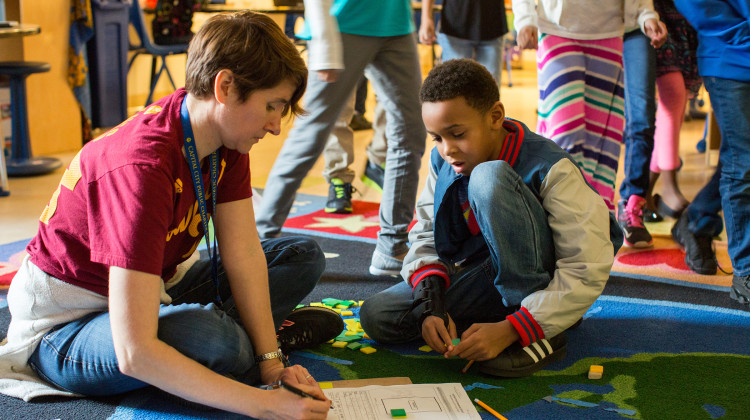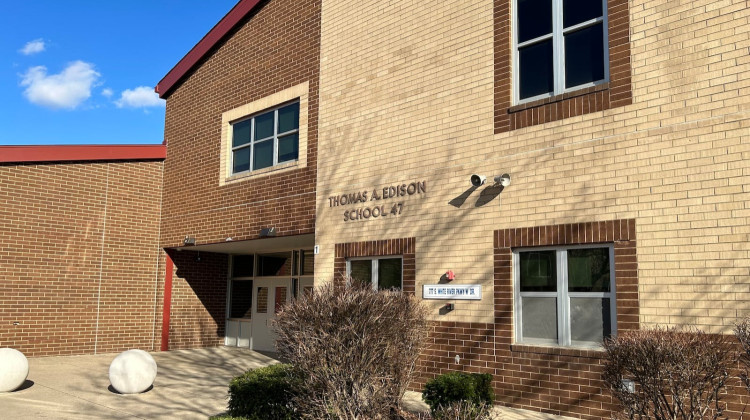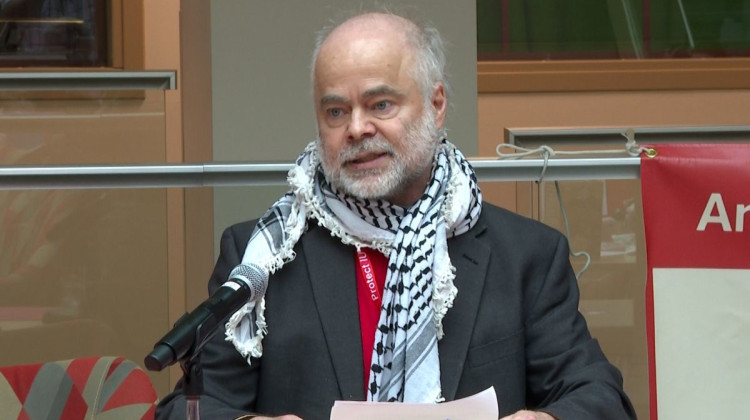
Students at Tindley Genesis Academy in Indianapolis participate in the morning meeting, which blends songs, chants and dancing. Music is at the center of all curriculum at the school.
Steve Burns/WTIUFrom the parking lot at Tindley Genesis Academy in Indianapolis – you can hear music.
Outside of the school, it’s a dull thumping, but once you enter the front door, drumming, shrieking and synchronized chanting greets you – before the secretary has a chance to say hello.
It’s coming from the gym.
Second through fourth grade classes stand on the sidelines of the basketball court, drumming, dancing and taking turns singing their class chants.
“This is our morning meeting that we have every morning, and our students get together, we celebrate together,” says Principal Todd Hawks. “Right now we’re hearing class chants, so every class is named after a college or university, so it’s the different cohorts between our schools doing their class chat.”
In addition to the class chants, teachers step into the center of the circle and share academic and emotional achievements of their students. At the end, Principal Todd Hawks leads the students in affirmations, giving encouragement for the day.
“Ambition,” Hawks yells out to the students.
“Ambition,” they respond.
“Is wanting,” he calls.
“Is wanting,” they return.
“To succeed!”
“To succeed!”
It’s not just the morning meeting – students have music class four days a week.
“They’re learning world drumming, piano, performing arts skills that teach them life skills, and how to read and write music,” Hawks says.
Music At The Center of Lessons
Tindley Genesis Academy opened two years ago, with the intention of having a music centered curriculum. Teachers are required to use music throughout their lessons. Rhythm, song and music are present in every subject, every day.
“Whether it’s learning different science concepts, math processes or acting out what we’re learning in reading and adding music to it because it makes learning more fun, more engaging and things easier to remember,” Hawks says.
And here’s what the music curriculum looks like in everyday lessons. First grade teacher Celeste Caraker stands in front of a calendar in her classroom with all of her students seated on the carpet, facing her.
“It’s Tuesday! It’s time for the days of the week song,” she says.
For first graders, learning how to determine the date is an important math skill.
“Doing the dates and the months, and knowing how long a week is and knowing them in order, like what day would come next, it’s important for sequencing the week and the month of the year,” Caraker says.
She asks her students if yesterday was Monday, what is today. And to help them figure it out, they all sing a song together. To the tune of the Adams Family theme song.
“There’s Sunday and there’s Monday, there’s Tuesday and there’s Wednesday, there’s Thursday and there’s Friday, and then there’s Saturday!”
Tindley Genesis Academy is part of the larger Tindley charter school network. Principal Hawks says Tindley schools wanted a school with a music-focused curriculum because studies indicate music is a strong learning tool.
“Kids who engage in music activities and lessons beginning at the age of 5, they outperform their peers on standardized tests, on college placement tests,” Hawks says.
Of course, many teachers across the state use music in their lessons, but they aren’t required to use this strategy. Teacher Celeste Caraker says her lesson planning takes much longer, but she knows it is worth it, because, in her words, it works.
Tindley Genesis is in its second year, and Principal Hawks says that’s given him time to see the social impact of the music curriculum.
Music As A Tool For Emotional Conversations
First grade teacher Caraker also uses music to help students express emotions.
“Generally a child is only born with the basic emotions, like angry, sad, mad, very simple emotions,” she says. “Things like empathy and sympathy and even like forming a conscious, those have to be taught and formed.”
For example, a few times a week she shows the kids a painting, and asks them what they think the artist felt when he or she painted it. She also plays music and has them dance to match the tone of the song. And during these lessons, she gives the kids time to draw and reflect on their favorite part of the painting or song.
And Caraker says using art and music helps her students express themselves.
“A lot of our scholars come from difficult family backgrounds,” she says. “Sometimes their family life is fluctuating, and by showing them art is a safe outlet where there’s no wrong answer is wonderful for them. Because they can find a safe, healthy way to let it out and discuss it, and that way it doesn’t impact negatively in their academic performance later in the day.”
Hawks says schools with music-driven curriculums can really thrive in a charter setting, since it’s a specific type of learning parents may want to opt into. And another charter school, with similar curriculum to Tindley Genesis, opens in the former Indianapolis Public Schools school 42 in the fall.
 DONATE
DONATE








 Support WFYI. We can't do it without you.
Support WFYI. We can't do it without you.